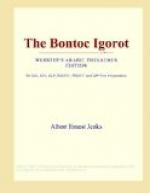In an isolated garden, called “fil-lang’,” now in ato Chakong, Lu-ma’-wig taught Bontoc how best to plant, cultivate, and garner her various agricultural products. Fil-lang’ to-day is a unique little sementera. It is the only garden spot within the pueblo containing water. The pueblo is so situated that irrigating water can not be run into it, but throughout the dry season of 1903 — the dryest for years in Bontoc — there was water in at least a fourth of this little garden. There is evidently a very small. but perpetual spring within the plat. Taro now occupies the garden and is weeded and gathered by Na-wit’, an old man chosen by the old men of the pueblo for this office. Na-wit’ maintains and the Igorot believe that the vegetable springs up without planting. As the watering of fil-lang’ is through the special dispensation of Lu-ma’-wig, so the taro left by him in his garden school received from him a peculiar lease of life — it is perpetual. The people claim that all other taro beds must be planted annually.
Lu-ma’-wig showed the people how to build the fawi and pabafunan, and with his help those of Lowingan and Sipaat were constructed. He also told them their purposes and uses. He gave the people names for many of the things about them; he also gave the pueblo its name.
He gave them advice regarding conduct — a crude code of ethics. He told them not to lie, because good men do not care to associate with liars. He said they should not steal, but all people should take care to live good and honest lives. A man should have only one wife; if he had more, his life would soon be required of him. The home should be kept pure; the adulterer should not violate it; all should be as brothers.
As has been previously said, the people of Bontoc claim that they did not go to war or kill before Lu-ma’-wig came.
They say no Igorot ever divorced a wife who bore him a child, yet they accuse Lu-ma’-wig of such conduct, but apparently seek to excuse the act by saying that at the time he was partially insane. Fu’-kan, Lu-ma’-wig’s wife, bore him several children. One day she spoke very disrespectfully to him. This change of attitude on her part somewhat unbalanced him, and he put her with two of her little boys in a large coffin, and set them afloat on the river. He securely fastened the cover of the coffin, and on either end tied a dog and a cock. The coffin floated downstream unobserved as far as Tinglayan. There the barking of the dog and the crowing of the cock attracted the attention of a man who rushed out into the river with his ax to secure such a fine lot of pitch-pine wood. When he struck his ax in the wood a voice called from within, “Don’t do that; I am here.” Then the man opened the coffin and saw the woman and children. The man said his wife was dead, and the woman asked whether he wanted her for a wife. He said he did, so she became his wife.




